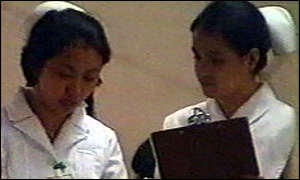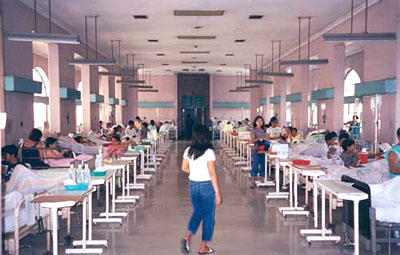UPDATE. Just updating this blog. Came across this really nice Editorial regardingt this topic. This must be the most well-thought of article i've ever read on the matter. Read it here.

Filipino nurses: where next? (Photo: www.bbc.com)
By Christian V. Esguerra
Inquirer News Service (www.inq7.net)
WARNING to health authorities: The Philippine health care system will collapse within the next two to three years as dismal working conditions continue to drive local doctors and nurses overseas.
The Alliance of Health Workers (AHW) yesterday made this disturbing prediction, pointing out that a total of 51,850 nurses left the country for greener pastures abroad from 2000 to 2003 alone.
This means that the country lost close to 13,000 nurses every year during that short period, according to Jossel Ebesate, AHW secretary general and nursing supervisor at the government-run Philippine General Hospital (PGH).
Worse, he said, more than 5,000 doctors joined the exodus to also work as nurses abroad from 2000 to 2004, and around 4,000 licensed physicians were now enrolled in nursing schools.
"This is disturbing," Ebesate told reporters after a forum in Quezon City. "If the trend continues, our health care system will collapse in the next two to three years."

Wards are full, but no caretakers
Dr. Bu Castro, president of the Philippine Medical Association, said about 30 percent of the country's 100,000 doctors had moved to North America.
Ebesate said opportunities for Filipino nurses were particularly plentiful in Canada, Ireland, the United Kingdom and the United States.
Unfortunately for the Philippines, a nurse's success abroad is a local hospital's suffering.
The unabated exodus of Filipino doctors and nurses, coupled with insufficient funding from the government, has forced a number of district hospitals to shut down, Ebesate said.
In Isabela, he said, at least nine government hospitals were closed in 2003 because not enough doctors and nurses could be found.
He also said two district hospitals in Aklan would most likely suffer the same fate, primarily because their respective municipal governments could no longer sustain their operations.
"'Understaffing' in government hospitals have worsened, [and] those who remain [are] overworked," the AHW said in a statement.
A classic example is the Dr. Jose Fabella Memorial Hospital in Manila, a 700-bed facility usually crowded by impoverished mothers.
So is the PGH, where patients have to make do with beds lining the corridors.

The Philippine General Hospital
Some hospitals have been driven to desperate methods in the course of trying to deal with the crisis.
In Cebu, a number of district hospitals are resorting to "outsourcing," or hiring private doctors to work for them, if only to avoid closure, Ebesate said.
He said one hospital in Iloilo was forced to hire medical interns to work as residents to remedy its lack of doctors.
The practice is alarming because interns have yet to take the medical board examinations, he said. Residents have passed the board and work in hospitals usually for three years before pursuing a field of specialization, he explained.
In hiring interns to work as residents, "there is the risk of having human errors," said Ebesate, a nurse of 17 years. "Let's just hope that nothing bad happens to patients."
Solution
An immediate solution to the problem is the implementation of the 2002 Nursing Law, which increases the starting salary from P9,939 to P13,300, according to Ebesate.
He observed, however, that the upgraded wage was still far from the P16,000 monthly salary needed to support a family of six.
Another proposal perennially floated in discussions is requiring those who have passed the medical board examinations to serve in local hospitals, especially in the countryside, before leaving for higher studies or work elsewhere, he said.
But other people say this is tantamount to curtailing a doctor's right to chart his/her career path.
No comments:
Post a Comment